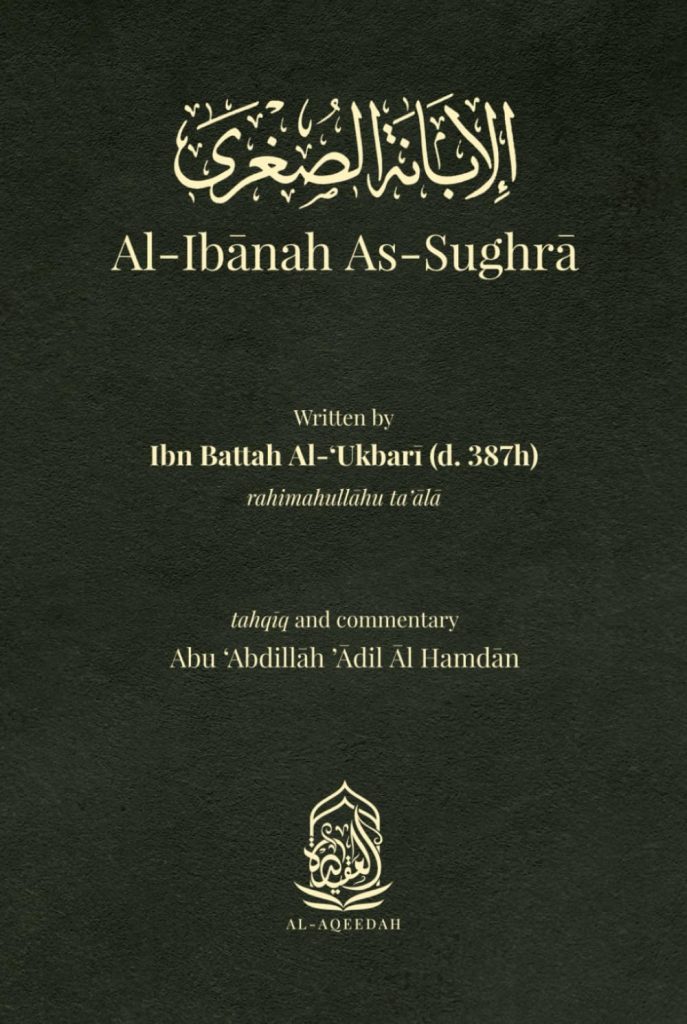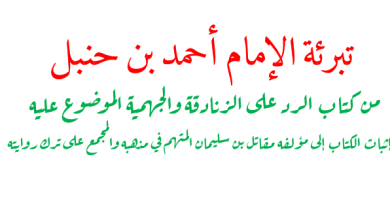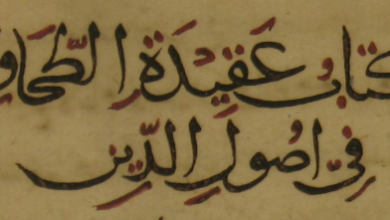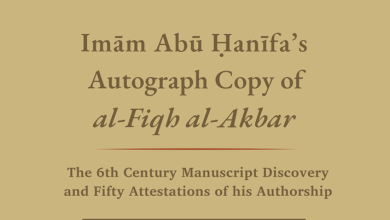Al-Albānī on Ibn Baṭṭa (d. 387 AH):
In contemporary Salafī theological discourse, several editors have undertaken critical editions and publications of doctrinal works authored by the 4th/10th century Ḥanbalī theologian Abū ʿAbd Allāh ʿUbayd Allāh ibn Muḥammad Ibn Baṭṭa al-ʿUkbarī (d. 387/997), notably his Al-Ibāna al-Kubrā (The Greater Clarification) and Al-Ibāna al-Ṣughrā (The Lesser Clarification). While Ibn Baṭṭa’s works have gained prominence in modern Salafī circles, his status as a reliable transmitter has been subject to significant scholarly criticism, a matter that will be examined in detail in another article on this site. Among his works, the following has been rendered into English:

The late Salafi writer known as Muḥammad Nāṣirud-Dīn al-Albānī (d. 1999) had the following to say in a conversation available on audio on this link:
السائل : على ذكر ابن بطة كتابه الإبانة الصغرى الذي … هل يؤخذ عنه في الأسماء والصفات مثلًا؟ ذكرت الابانة لكن هل الإبانة الكبرى أو الصغرى؟
Questioner: Speaking of Ibn Baṭṭa, his book Al-Ibāna Al-Ṣughrā which… can it be relied upon regarding the Divine Names and Attributes for example? You mentioned Al-Ibāna but is it Al-Ibāna Al-Kubrā or Al-Ṣughrā?
الشيخ : ما أستحضر الجواب الآن، عندنا في المكتبة الظاهرية نسخة خطية من الابانة مشوشة الترتيب، وكانت أصابها الماء ومحا كثيرًا مِن كتابتها، وكنت استفدت منها أشياء كثيرة فتجلى لي أنّ ابن بطة من الحنابلة الذين عندهم شيء من الغلو في إثبات الصفات، وقد يثبتون صفة بروايات لا تصح أسانيدها، وإن صحت فلا تصح نسبتها إلى الرسول عليه السلام؛ لأنها تكون إما – يعنى – موقوفة وإما مقطوعة، وعلى نحو هذا الدارمي في رده على المريسي، … والحقيقة أنه هذا الموضوع هام جدًّا، وينبغي تصفية الروايات الضعيفة وإبعادها عن العقيدة الصحيحة، وهذا ما حاولت القيام به حينما اختصرت ” العلو للعلي الغفار ” أو ” للعلي العظيم ” للإمام الذهبي، … كون الامام الذهبي – كما تعلمون – إمامًا في هذا الصدد، ومع ذلك تساهل في ذكر بعض الروايات ومنها مثلًا رواية مجاهد أنّ الله عز وجل يقعد معه النبي صلى الله عليه وسلم على عرشه، وهذه رواية تلقاها الكثير ممن … عقيدتهم كأنه حديث مرفوع عن الرسول عليه السلام، مع أنه لو قال مجاهد: قال رسول الله صلى الله عليه وسلم في حديث فقهي لكان هذا الحديث مرسلًا ولا يثبت به حكم فقهي، فكيف وهو – أوَّلًا – لم يرفعه إلى الرسول عليه السلام، وثانيًا: هو في العقيدة وليس في الفقه، ومع ذلك تلَقَّوْه على طريقة التسليم أو المسَلَّمات، فالحقيقة ينبغي الاحتياط في مثل هذه القضايا.
Shaykh: I cannot recall the answer now. We have in the Ẓāhiriyya Library a manuscript copy of Al-Ibāna that is disorganized in arrangement, and it had been damaged by water which erased much of its writing. I had benefited many things from it, and it became clear to me that Ibn Baṭṭa was among the Ḥanbalīs who had some exaggeration (al-ghuluw) in affirming the divine attributes, and they would sometimes affirm attributes through narrations whose chains of transmission are not authentic, and even if authentic, their attribution to the Messenger (peace be upon him) is not authentic because they are either suspended [mawqūf] or disconnected [maqṭūʿ]. Similarly with al-Dārimī in his refutation of al-Marīsī... The truth is that this topic is very important, and weak narrations should be filtered out and kept away from correct doctrine. This is what I attempted to do when I summarized “Al-ʿUluw lil-ʿAlī al-Ghaffār” or “lil-ʿAlī al-ʿAẓīm” by Imam al-Dhahabī… Given that Imam al-Dhahabī – as you know – is an authority in this regard, yet he was lenient in mentioning some narrations, including for example Mujāhid’s narration that Allah, the Mighty and Majestic, seats the Prophet (peace be upon him) with Him on His throne. This narration was received by many whose… doctrine is as if it were a raised [marfūʿ] hadith from the Messenger (peace be upon him), even though if Mujāhid had narrated a juristic hadith saying “The Messenger of Allah (peace be upon him) said,” this hadith would be considered disconnected [mursal] and no juristic ruling would be established by it. So how about when – firstly – he did not raise it to the Messenger (peace be upon him), and secondly: it concerns doctrine and not jurisprudence, yet they received it as if it were among the accepted givens. The truth is one should be cautious in such matters.
السائل : … .
الشيخ : هذا يحتاج إلى شيء من السياق، التعارض عندك … .
يا الله، نحن معكم على الموعد إن شاء الله
Questioner: …
Shaykh: This needs some context, the contradiction you have…
Oh Allah, we are with you at the appointed time, Allah willing.
السائل : الله يبارك فيك
الشيخ : لكن باقي لموعد إخوانا
السائل : عشر دقائق
الشيخ : خمس دقائق تقريبًا
Questioner: May Allah bless you.
Shaykh: But there remains time for our brothers’ appointment.
Questioner: Ten minutes.
Shaykh: Approximately five minutes.
السائل : طيب على ذكر كتابي السنة وكتاب الدارمي
الشيخ : نعم
السائل : السؤال … الجواب، كتاب السنة ما أكملت تخريجه؟
الشيخ : أي نعم
Questioner: Alright, speaking of the two books “Al-Sunna” and the book of al-Dārimī…
Shaykh: Yes.
Questioner: The question… the answer, you haven’t completed the documentation [takhrīj] of “Kitāb al-Sunna”?
Shaykh: Yes, that’s right.
السائل : هل هذا يعنى تستمر في طبعة أخرى أو لماذا؟
الشيخ : لا، هذا قضية أنه سنتمم التحقيق هذا في علم الغيب
السائل : يعنى ما هو موجود الآن؟
الشيخ : نعم نعم، هل سنتفرغ لإتمامه أم لا فهذا في علم الغيب، أمَّا لماذا؟ فذلك لأنني كنت قد كُلِّفت مِن الأخ زهير بتحقيق هذا الكتاب، فلما طال الأمد – لأنه أنا في عندي … انشغال في أمور أخرى – لما طال الأمد يبدو أنه قد تسنى له من ألح عليه بطباعة كتاب من أهل السنة، ولذلك أخذ الإتحاف قبل أن … التخريج وطبعه كما ترون، أما هل سنعود؟ فالله أعلم هذا … المستقبل.
Questioner: Does this mean you will continue with another edition or why?
Shaykh: No, this matter of completing the verification is in the knowledge of the unseen.
Questioner: You mean it’s not available now?
Shaykh: Yes, yes. Whether we will have time to complete it or not is in the knowledge of the unseen. As for why? That’s because I had been tasked by brother Zuhayr to verify this book, but when time dragged on – because I have… involvement in other matters – when time dragged on, it seems that someone who insisted on printing a book from Ahl al-Sunna became available to him, and therefore he took the Itḥāf before… the documentation and printed it as you see. As for whether we will return to it? Allah knows best, this… the future.
السائل : كتاب الدارمي طبع لاسمك مع المتن والتخريج
الشيخ : هذه أعمال تجارية، مع الأسف، وبهذه المناسبة لقد رأينا ما هو أعجب من ذلك، … الكتاب يعني لعلكم تذكرون، رأيت كتابًا نُسِب إلى ابن قدامة الحنبلي وهو ليس له، وتَقَصَّدُوا من ذلك من أجل الترويج للكتاب في البلاد السعودية، الآن الناشرون عندهم طرق في التجارة بالكتب عجيبة جدًّا، يستغلون أسماء بعض المشهورين في سبيل نشر الكتاب، ولو أن يُنسَب الكتاب لغير مؤلفه، فهذا سهل بالنسبة لذاك مع الأسف نعم.
Questioner: The book of al-Dārimī was printed with your name along with the text and documentation.
Shaykh: These are commercial works, unfortunately. And by this occasion, we have seen what is even more surprising than that… the book, I mean perhaps you remember, I saw a book attributed to Ibn Qudāma al-Ḥanbalī that was not his, and they intended by that to promote the book in Saudi Arabia. Now publishers have very strange methods in book trading, they exploit the names of some famous people for the sake of publishing the book, even if the book is attributed to someone other than its author. This is easy compared to that, unfortunately, yes.
In another conversation available on audio on this link al-Albānī explained what he thought of Ibn Baṭṭa as a transmitter of narrations:
السائل : هنا حديث الأعمى الذي قتل المرأة … تشتم النبي – صلى الله عليه وسلم – ؛ ما رواه الشعبي عن علي أن يهودية كانت تشتم النبي – صلى الله عليه وسلم – فتقع فيه ، فخنقها رجل حتى ماتت ، فأبطل رسول الله – صلى الله عليه وسلم – دمَها ، هكذا رواه أبو داود في ” سننه ” وابن بطة في ” سننه ” ، ابن بطة هل … ؟
Questioner: Here is the hadith of the blind man who killed the woman… who insulted the Prophet (peace be upon him); what al-Shaʿbī narrated from ʿAlī that a Jewish woman used to insult the Prophet (peace be upon him) and defame him, so a man strangled her until she died, and the Messenger of Allah (peace be upon him) invalidated [the punishment for shedding] her blood. This is how Abū Dāwūd narrated it in his “Sunan” and Ibn Baṭṭa in his “Sunan.” Ibn Baṭṭa, did he…?
الشيخ : مش معروف كتاب ” السنن ” ، أما ابن بطة معروف أنه من كبار الحنابلة علماء الحنابلة والمحدثين في وقت واحد ، لكن تكلَّم بعضهم في حفظه ، فأحاديثه هو تفرَّد بها تُؤخذ منه على حذر ، أما إذا شارك غيره بذلك فهو إما أن يستفاد منه كما يستفاد من الحديث الذي يُستشهد براويه .
Shaykh: The book “Al-Sunan” is not well-known, but Ibn Baṭṭa is known to be among the major Ḥanbalī scholars and hadith scholars simultaneously. However, some scholars have criticized his memory, so the hadiths that he alone narrated should be taken from him with caution. As for when he shares [in narration] with others, then it can be benefited from just as one benefits from a hadith whose narrator is used for supporting evidence [istishhād].
Also the following compilation known as Mawsūʿat al-Albānī fī al-ʿAqīda quoted al-Albānī saying the following about Ibn Baṭṭa:
https://app.turath.io/book/36190?page=2618
مَثَلاً كابنِ بَطَّة الحَنْبَلي صاحِب «الإبانة» فَهُوَ عَلى هَذا النَّمَط، لَكِنَّهُ يَرْوي في إبانَتِهِ نَفْسِهِ ما هَبَّ وَدَبَّ مِنْ أحاديث حَتَّى ما كانَ مِنْها مُتَعَلِّقاً بِالصِّفات…
For example, like Ibn Baṭṭa al-Ḥanbalī, author of “Al-Ibāna,” he follows this pattern, but he narrates in his Ibāna itself all sorts of indiscriminate hadiths including those related to [divine] attributes…
فَهَذِهِ نُقْطَة مُهِمَّة جِدّاً لَيْسَ كُلُّ مَنْ يَكْتُبُ في الصِّفاتِ يَكونُ مُتَحَقِّقاً فيما يَذْكُرُ مِنَ الرِّوايات.
This is a very important point – not everyone who writes about [divine] attributes is meticulous in what they mention of narrations.
Al-Albānī’s verdict on al-Ibana al-Sughra of Ibn Batta
Al-Albānī said the following in his Silsilat al-Aḥādīth al-Ḍaʿīfa wa-al-Mawḍūʿa wa-Atharuhā al-Sayyi’ fī al-Umma (14/941, see – https://app.turath.io/book/12762?page=10906):
ولعل أصل الحديث إنما هو باللفظ الذي ساقه أبو عبد الله بن بطة في ” الشرح والإبانة على أصول السنة والديانة ” (204/ 379) :
” من أطاع امرأته في كل ما تريد … ” الحديث نحوه.
وعلق عليه صهري أبو رشيد بقوله:
” ضعيف؛ فقد أورده ابن عراق في ” تنزيه الشريعة ” وعزاه للدارمي (2/215) “!
وهذا وهم فاحش! منشؤه عدم الانتباه لاصطلاح ابن عراق لرمزه المتقدم (مي) أنه لـ (للديلمي) ، فتوهم أنه أراد (الدارمي) على اصطلاح مؤلف كتاب ” مفتاح كنوز السنة ” – تأليف مستشرق هولندي -.
(تنبيه) : كتاب ابن بطة هذا أحاديثه معلقة غير مسندة، ويغلب على الكثير منها الضعف والنكارة والوضع، وقد قام بتخريجها صهري المذكور تخريجاً لا بأس به إلى حد ما؛ فقد قصر في تخريج كثير من أحاديثه تقصيراً ظاهراً؛ مثل
” إن الله لا ينترع العلم انتزاعاً من صدور العلماء … ” رقم (20) .
Meaning:
Perhaps the origin of the hadith is only in the wording that Abū ʿAbdullāh ibn Baṭṭa presented in “al-Sharḥ wa-al-Ibāna ʿalā Uṣūl al-Sunna wa-al-Diyāna” (204/379): “Whoever obeys his wife in everything she wants…” the hadith is similar to it. My son-in-law Abū Rashīd commented on it saying: “Weak [ḍaʿīf]; for Ibn ʿArrāq included it in ‘Tanzīh al-Sharīʿa’ and attributed it to al-Dārimī (2/215)”! And this is a grave error! Its origin is the failure to notice Ibn ʿIrāq’s convention for his aforementioned symbol (mī) that it is for (al-Daylamī), so he imagined that he meant (al-Dārimī) according to the convention of the author of “Miftāḥ Kunūz al-Sunna” – written by a Dutch orientalist. (Note): This book of Ibn Baṭṭa contains suspended [muʿallaq] hadiths without chains of transmission [isnād], and most of them are predominantly weak [ḍaʿīf], rejected [munkar], and fabricated [mawḍūʿ], and my aforementioned son-in-law undertook their extraction with referencing [takhrīj] in a manner that is somewhat acceptable; however he fell short in the takhrīj of many of its hadiths in an apparent way; such as his saying ﷺ: “Indeed Allah does not extract knowledge by extracting it from the breasts of scholars…” number (20). End of quote.
The work that al-Albānī mentioned was al-Sharḥ wa-al-Ibāna ʿalā Uṣūl al-Sunna wa-al-Diyāna, and it is also known as al-Ibāna al-Sughra.
The translator(s) of the above english edition did not address the significant concerns regarding Ibn Baṭṭa’s reliability as a ḥadīth transmitter, nor did they include the critical assessments made by major classical scholars regarding his documented weaknesses in narration.






